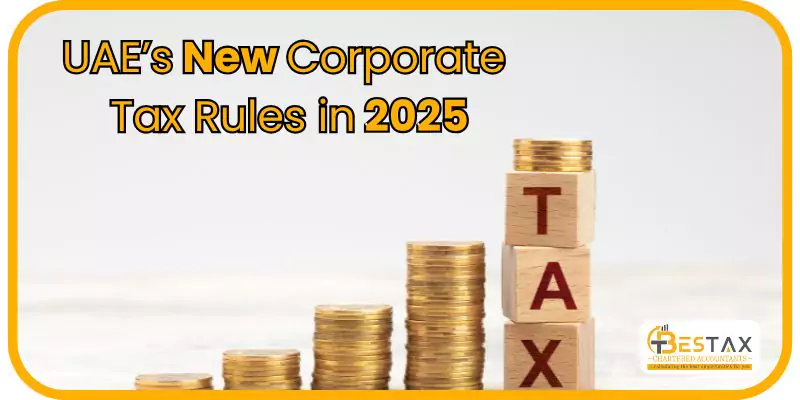The United Arab Emirates (UAE) has introduced new updates to its corporate tax framework, impacting foreign investors and non-resident entities. The introduction of Cabinet Decision No. 35 of 2025 clarifies the conditions under which non-resident juridical investors in Qualifying Investment Funds (QIFs) and Real Estate Investment Trusts (REITs) have a taxable presence, or “nexus,” in the UAE. This decision, which replaces Cabinet Decision No. 56 of 2023, aims to increase transparency and streamline compliance for foreign investors.
UAE New Corporate Tax Rules in 2025?
The UAE’s tax world has changed with the introduction of Federal Decree-Law No. 47 of 2022, establishing a federal corporate tax on business profits. To provide further clarity, the Ministry of Finance issued Cabinet Decision No. 35 of 2025, including the circumstances under which non-resident investors are considered to have a taxable nexus in the UAE.

Who Does It Apply To?
- Residents: Entities incorporated or effectively managed in the UAE are subject to corporate tax on their worldwide income.
- Non-Residents: Non-resident juridical persons are taxed on income sourced from the UAE, particularly if they have a permanent establishment or meet the nexus criteria outlined in Cabinet Decision No. 35 of 2025.
- Free Zones: Entities operating in Free Zones can benefit from preferential tax rates, provided they meet specific conditions related to Qualifying Income.
Who Is Subject to Tax? Understanding Nexus-Based Taxation
The concept of taxable nexus is important in knowing the tax obligations of non-resident juridical investors in the UAE.
Taxable Nexus
A taxable nexus refers to a connection or link between a non-resident entity and the UAE, establishing the entity’s liability to pay corporate tax in the country. This nexus can be established through various means, including:
- Permanent Establishment: A fixed place of business through which the entity conducts its operations wholly or partially.
- UAE-Sourced Income: Income derived from activities or assets within the UAE.
- Significant Economic Presence: Engaging in substantial economic activities in the UAE, even without a physical presence.
Non-Resident Juridical Investor
A non-resident juridical investor is a legal entity established outside the UAE that invests in UAE based assets or entities. Under Cabinet Decision No. 35 of 2025, such investors have a taxable nexus in the UAE under specific conditions.
UAE-Sourced Income and Nexus Conditions
Income is considered UAE-sourced if it is derived from:
- Real Estate Assets: Income from immovable property located in the UAE, including rentals and capital gains.
- Business Activities: Profits from any business conducted within the UAE.
- Services Rendered: Fees for services performed in the UAE.
The nexus conditions outlined in Cabinet Decision No. 35 of 2025 specify that a non-resident juridical investor in a QIF or REIT establishes a taxable nexus in the UAE if:
- Dividend Distribution: The QIF or REIT distributes 80% or more of its income within nine months from its financial year-end. In this case, the nexus is established on the date of dividend distribution.
- Ownership Acquisition: If the QIF or REIT fails to meet the 80% distribution threshold, the nexus is established on the date the ownership interest is acquired.
Additionally, failure to meet diversity of ownership conditions in a tax period can also establish a nexus for the non-resident investor.
Key Tax Rates, Thresholds, and Exemptions in 2025
Understanding the applicable tax rates, thresholds, and exemptions is important for compliance and strategic planning.
Corporate Tax Rates
- 0% Rate: Applicable to taxable income up to AED 375,000, supporting small businesses and startups.
- 9% Rate: Applied to taxable income above AED 375,000.
- 15% Rate: A Domestic Minimum Top-up Tax (DMTT) of 15% is imposed on large multinational enterprises with consolidated global revenues of EUR 750 million or more, aligning with the OECD‘s global minimum tax framework.
Free Zone Considerations
Entities operating within Free Zones may benefit from a 0% corporate tax rate on Qualifying Income, provided they adhere to specific conditions, such as:
- Maintaining Adequate Substance: Demonstrating substantial activities within the Free Zone.
- Non-Qualifying Income: Income derived from mainland UAE or other non-qualifying activities may be subject to the standard corporate tax rates.
Financial Year-End and Tax Obligations
- Financial Year-End: Typically set at December 31, but entities may choose a different fiscal year aligning with their parent company or international operations.
- Tax Filing Deadline: Corporate tax returns must be filed within nine months following the end of the financial year.
- Payment of Tax Liabilities: Any corporate tax due should be settled concurrently with the filing
Impact on Investment Structures: QIFs, REITs, & Real Estate
Under the new UAE tax rules introduced by Cabinet Decision No. 35 of 2025, the tax rules for investment funds like Qualifying Investment Funds (QIFs) and Real Estate Investment Trusts (REITs) are now clearer. This gives more certainty to foreign investors who manage real estate or other investment portfolios in the UAE.
What Are QIFs and REITs?
Qualifying Investment Funds (QIFs) are funds that bring together money from investors to make profits by buying, holding, and selling investments. These funds must mainly focus on investment activities, and other types of income must not be more than 5% of their total income.
Real Estate Investment Trusts (REITs) are a type of QIF that invest mainly in real estate that earns rental income. They allow people to invest in large property projects and must pay out most of their profits to investors.
Both QIFs and REITs are commonly used by foreign investors in the UAE. They are set up in a way that can help reduce taxes under the current rules.
Criteria for Tax Exemption
To benefit from exemption under the UAE corporate tax rules, QIFs and REITs must satisfy several regulatory and ownership structure conditions:
- Diversity of Ownership: The fund must not be overly concentrated. For QIFs, having fewer than 10 investors and one investor owning 30% or more could negate the exemption. With 10 or more investors, the threshold increases to 50%.
- Dividend Distribution Threshold: If the QIF or REIT distributes 80% or more of its immovable property income within 9 months from the end of the financial year, investors may avoid taxable nexus. This rule directly impacts the timing and structure of dividend distributions.
- Acquisition Date Relevance: If the 80% dividend threshold is not met, then the investor’s acquisition date of their interest in the fund is used to establish a taxable nexus, potentially leading to tax obligations.
- Ownership Structure: Funds must ensure they are not under investor control, and all entities under their control must comply with rules prohibiting income from UAE immovable property if seeking tax exemption.
Practical Implications for Foreign Investors
With the introduction of the UAE’s new tax rules, foreign investors must act quickly to review their positions and make decisions accordingly.
Here’s what you should be doing right now:
What Foreign Investors Need to Do Now
- Evaluate Nexus Exposure: Assess if your holdings in UAE-based funds create a taxable nexus, particularly if you’re a non-resident juridical investor.
- Review Investment Vehicles: Ensure that your REITs and QIFs meet the conditions for tax exemption and consider diversifying ownership to stay compliant.
- Implement Strategic Dividend Planning: Time your dividend distributions to meet the 80% rule within 9 months of your fund’s financial year-end.
- Analyze Ownership Structure: Verify that your shareholding percentages and voting rights do not breach exemption thresholds.
- Update Acquisition Date Records: Maintain clear documentation on when interests were acquired in order to determine potential tax exposure.
- Seek Professional Structuring Advice: Consider restructuring certain holdings or forming entities that better align with UAE tax laws.
These steps can make the difference between a seamless investment operation and unexpected tax liabilities.
Filing, Reporting, & Compliance for Non-Residents
As Cabinet Decision No. 35 of 2025 tightens the compliance landscape, non-resident investors with UAE ties must stay alert to their tax obligations and reporting responsibilities.
Registration & Reporting Deadlines
- Initial Registration: Non-residents with UAE-sourced income or nexus must register with the Ministry of Finance promptly, generally within 3 months of becoming subject to tax.
- Annual Returns: Corporate tax returns must be filed within 9 months of the financial year-end. For example, for a fiscal year ending December 31, the deadline is September 30 of the following year.
- Payment of Taxes: Tax liabilities are due at the same time as the return. Late payment may result in penalties and interest.
- Supporting Documentation: Investors must maintain proper accounting records, proof of ownership structure, acquisition dates, dividend distributions, and supporting contracts, all in line with UAE regulatory conditions.
Practical Implications for Non-Residents
- Nexus triggers filing even without physical presence.
- Holding investment interests in real estate may require depreciation adjustments.
- Undistributed profits may still be taxable if thresholds are breached.
- A local tax agent can represent non-resident investors before the Federal Tax Authority.
Need Help with UAE New Tax Rules?
The UAE New Tax Rules bring both opportunities and risks for foreign investors. Whether you’re reviewing your current investment strategy, restructuring entities, or preparing for your first UAE tax filing, expert guidance is essential.
Bestax offers specialized services in:
- Accounting and bookkeeping services
- Corporate tax registration and filing
- End-to-end compliance support
Get in touch with Bestax today to make your investment in the UAE secure, compliant, and tax-smart.
FAQs About UAE New Tax Rules
Are non-resident investors taxed in the UAE?
Nonresident juridical investors may be taxed if they establish a taxable nexus through income from UAE real estate, business activities, or significant influence in investment funds.
What is a taxable nexus?
A taxable nexus is a connection between a foreign entity and the UAE, making it liable to pay corporate tax. It can be established by earning UAE-sourced income, holding large interests in REITs/QIFs, or through the timing of acquisition or dividend distributions.
Are REITs fully exempt?
REITs can be exempt from corporate tax if they meet specific criteria, including having AED 100 million+ in rental real estate assets, distributing 80% of income within 9 months, and fulfilling diversity of ownership requirements.
How does the acquisition date affect my tax status?
If your REIT or QIF fails to meet the 80% dividend rule, your acquisition date becomes the reference point for determining when a taxable nexus was established—potentially leading to backdated tax liabilities.
What if I don’t meet the diversity of ownership conditions?
Failure to meet these conditions may result in the loss of QIF or REIT tax exemption. Investors may then be deemed to have a nexus and be liable for tax on their prorated share of fund income.
Disclaimer: The information provided in this blog is for general informational purposes only. For professional assistance and advice, please contact experts.





